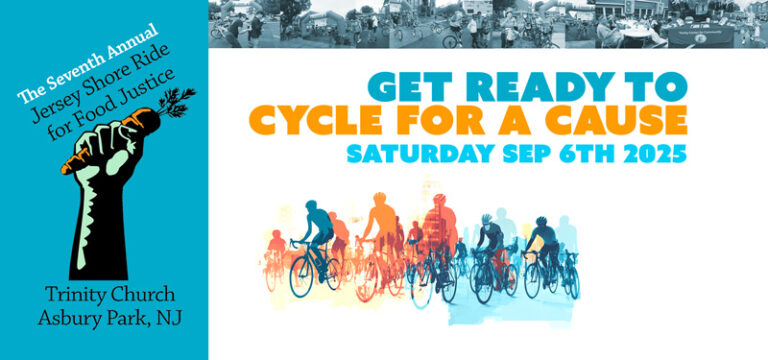Welcome to Trinity,
our joyful,vibrant
community
Join us for Worship
SUNDAYS
- 8:00 AM Spoken Holy Eucharist in the Church
- 10:00 AM Choral Holy Eucharist in the Church
WEDNESDAYS
- 6.30 PM Spoken Holy Eucharist in the Church
FRIDAYS
- 7.30 AM Morning Prayer in the Church
-
Trinity Church
503 Asbury Avenue
Asbury Park, NJ 07712 - (732) 775-5084
- Email us
Join us for worship
SUNDAYS
8:00 AM Holy Eucharist in the Church A simple, traditional spoken service. We use the Book of Common Prayer, Rite II, for this service.10:00 AM Holy Eucharist in the Church Joyous music and preaching that relates the Gospel to today’s questions.
10:00 AM Holy Eucharist Online
WEDNESDAYS
6:30 PM Holy Eucharist in the Church A quiet, contemplative mid-week Holy Eucharist service held in the church.Healing Service on the first Wednesday of the month.
FRIDAYS
7:30 AM Morning Prayer in the ChurchHoly Week & Easter Services
April 14 | Holy Monday
7pm Holy Eucharist with a Contemplative Conversation in place of the sermon
April 15 | Agape Liturgy & Meal
7pm Combined worship and table fellowship
April 15 | Holy Wednesday
7pm Tenebrae (no Eucharist)
April 17 | Maundy Thursday
7pm Holy Eucharist with Stripping of the Altar, Foot Washing, and music;
The Rev. Geoff Curtiss preaching
Also livestreamed on our YouTube Channel here.
April 18 | Good Friday
7am After the All-Night Watch, Communion from the Reserved Sacrament
Noon A service of readings, prayers and reflections on the Stations of the Cross;
The Rev. Chase Danford preaching
7pm Good Friday liturgy with sermon, communion from the reserved sacrament,
Veneration of the Cross. and music; The Rev. Chase Danford preaching
Also livestreamed on our YouTube Channel here
April 19 | Holy Saturday and The Great Vigil of Easter
10am Children’s Interactive Easter Eve Walk
11:30am Holy Saturday Liturgy of the Word. A brief, simple service of prayers and readings reflecting on Jesus in the tomb.
7pm Easter Vigil and Holy Eucharist with music; The Rev. Chase Danford preaching
Also livestreamed on our YouTube Channel here
April 20 | Easter Sunday
6:05am Easter Sunrise Service at the Beach with homily and singing! Service will be held at the northern-most end of the Asbury Park Boardwalk in front of Asbury Tower. There is a free parking lot and free street parking available until 9am.
Also livestreamed on Facebook
8am Easter Day Holy Eucharist with sermon and music; The Rev. Chase Danford preaching
10am Festive Easter Day Holy Eucharist with choir and brass;
The Rev. Chase Danford preaching
Also livestreamed on our YouTube Channel here.
Faith and Love
in Action
Watch the latest livestreamed service
Watch the latest sermon
Watch the latest livestream service
Sunday March 1 | The Second Sunday in Lent
Watch the latest sermon
Sunday February 22 | The First Sunday in Lent Sermon
This Week at Trinity
Click below to see what's coming up at Trinity in the next few months
Frequently Asked Questions
No, all are welcome to attend services. We have regular attendees who are not baptized and even some who are part of other religious traditions.
Absolutely! People of all faiths and no religious affiliation are welcome to volunteer with the Trinity Center for Community.
Good question. Many visitors remark that our services feel quite similar to those in the Roman Catholic Church, but there are some notable differences in theology, practice, and worship: In the Episcopal Church we recognize LGBTQ+ people as equal, so we bless same-sex marriages and welcome queer and trans people into leadership; clergy can be of any gender and all can be married; there is no centralized authority figure like the pope; lay people play a greater role in decision making, and bishops have less authority; sacramental confession is optional not required; married couples are permitted to use birth control; divorced persons are allowed to remarry in the church; and a multiplicity of understandings of the Holy Eucharist (Communion, the Lord’s Supper, the Mass) are permitted (most Episcopalians do not believe in transubstantiation, for example, although some do).
A number of traditionally Roman Catholic spiritual disciplines, such as praying the rosary and devotion to Mary and the saints, are beloved by some Episcopalians, but those are usually practiced on an individual level rather than in public worship services. We do have religious orders (monks and nuns), but monastic orders are not as common as in the Roman Catholic Church.
Yes, divorced people are welcome to worship, to receive Holy Communion, and to remarry in the church (pending permission from the bishop, which is almost always granted).
Contact the Rector, the Rev. Chase Danford, to let him know of your interest.
Yes, we believe all people are divinely and wonderfully made, and we welcome queer and trans people into all aspects of church life.
Yes, both clergy and trained lay volunteers visit people in hospitals, care facilities, and homes.
The Episcopal Church worships in the “liturgical style,” which means all Episcopal churches follow a relatively common order of service. Being with a community of believers inspires us, nurtures us, encourages us, and comforts us. Scripture and the Eucharist (Holy Communion) are the foundations of our worship. The service follows an order found in our worship book called the Book of Common Prayer; however, a service leaflet is distributed every Sunday to help you follow along.
Don’t worry. You won’t be embarrassed or singled out. At Trinity, as with most Episcopal churches, we provide a “service bulletin” during each Sunday service. It guides you through the service and provides basic instructions for participation. Once you’ve been to a few services, it will seem like second nature to you. The Book of Common Prayer can also serve as a guide to our Sunday worship service (sometimes called our “liturgy”), as well as a wide range of other services for everything from baptism to funerals.
Practices vary – even among individual Episcopalians. The bulletin and the officiant of the service will offer direction on when to stand, sit or kneel.
Yes. Baptism and Eucharist (Communion), as well as Confirmation, Reconciliation, Holy Matrimony, Holy Orders (Ordination), Anointing of the Sick (Unction).
Yes. We believe that the grace conferred by the Sacrament of Baptism is not and should not be reserved only for adults. Every human being is in relationship with God. We honor that relationship from the moment of birth and infancy is not a barrier to full initiation into the Body of Christ.
No. Once you have been baptized in any Christian church with water in the name of the Trinity, you have been received into the family of Christ (not into a particular denomination). To make a public, adult affirmation of faith, you can be confirmed. You also have the option of publicly reaffirming your baptismal vows, even after confirmation, if you so choose.
Yes. Women serve as priests, deacons, bishops, and in many other positions in the Episcopal Church today. Our highest office, the Presiding Bishop, was filled by a woman from 2006-2015.
Yes. Absolutely. It’s a personal decision on their part.
Yes, enthusiastically! Some bishops have permitted same-sex unions for decades, and the Episcopal Church officially codified marriage equality in 2015. Not every parish or clergyperson is supportive of same-sex marriage, and they are allowed to follow their conscience, but they must make provision for a couple to be married at a nearby parish that is supportive. Trinity has warmly celebrated many same-sex marriages!
The Anglican Communion consists of all the churches in this relationship. It includes more than 85 million people in more than 600 dioceses. The Anglican Communion is global with members in 165 countries.
The Archbishop of Canterbury, considered the first among equals, leads the Church of England and therefore the Anglican Communion. As the member churches are in communion, the Archbishop does not have the same authority over Anglican churches that the Pope has over the Roman Catholic Church.
Download our New Member Form below.
Ways to Support
Trinity Church
Consider donating to the church to support maintenance, programs, events, and charitable causes. Donations show commitment to the church’s values and provide a space for worship.
Donations can be given anonymously. Every contribution, no matter how small, supports the church’s mission and impact on the community.
Stay up to date.
Sign up for our newsletter.
By submitting this form, you are consenting to receive marketing emails from: Trinity Church, 503 Asbury Avenue, Asbury Park, NJ, NJ, 07712, https://www.trinitynj.com. You can revoke your consent to receive emails at any time by using the SafeUnsubscribe® link, found at the bottom of every email. Emails are serviced by Constant Contact





